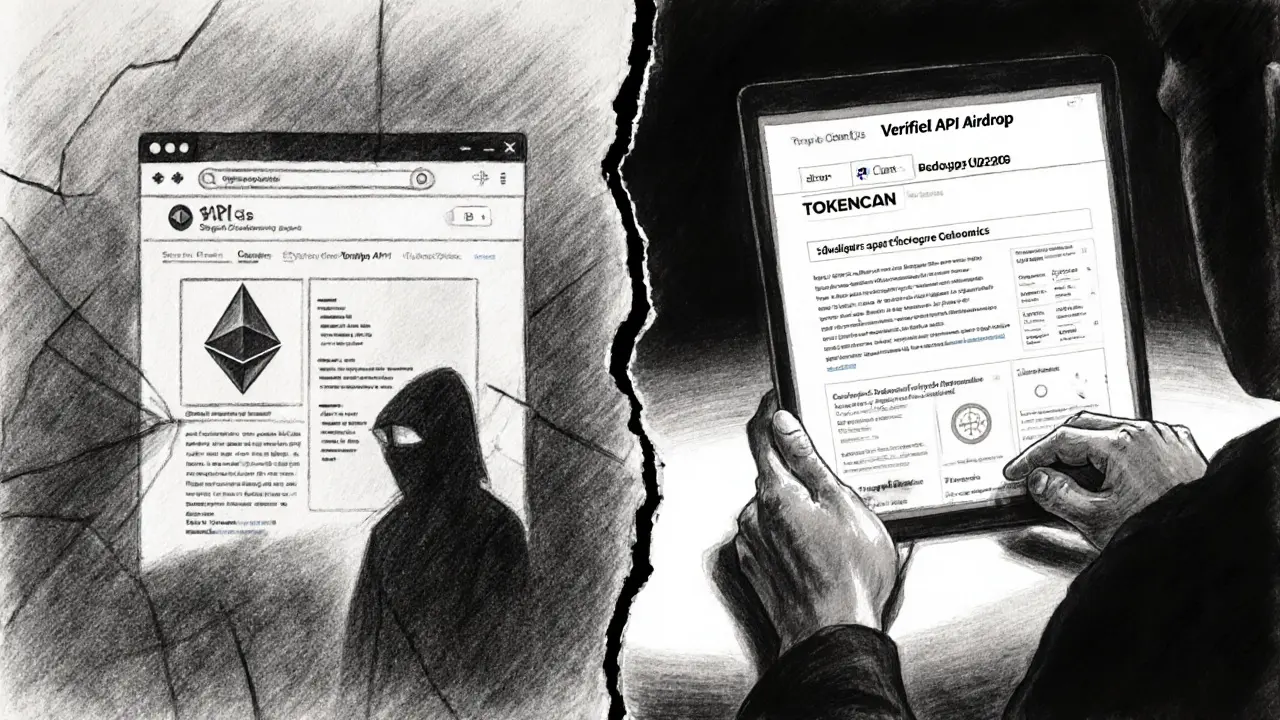APIS Airdrop Checker
When a new token is promised for free, the first question is: "Is it real or just hype?" The recent buzz around the APIS airdrop has many wallets buzzing, but concrete details are thin. Below you’ll find a clear breakdown of what’s actually known, how to spot legit airdrops, and a practical checklist to protect yourself.
What is The APIS?
The APIS is a cryptocurrency project that markets itself as an API‑centric token ecosystem designed for developers building on multiple blockchains. The team claims to offer a suite of developer tools, but public documentation is limited and the official website redirects to a placeholder page as of October2025.
Why information is scarce
Search engines return almost nothing beyond generic mentions of "Crypto APIs" - a separate company that offers blockchain infrastructure services. The APIS appears to be a brand‑new initiative with no audited whitepaper, no verified social media accounts, and no listings on major exchanges. This lack of transparency is a red flag, especially when airdrop promises surface.
How to verify any airdrop
- Check the smart contract address on a block explorer (Etherscan, BscScan). A verified contract with source code is a good sign.
- Look for a published tokenomics sheet: total supply, allocation percentages, and vesting schedules.
- Confirm the team’s identities. LinkedIn or GitHub profiles should show relevant blockchain experience.
- Search for third‑party audits. Reputable firms like CertiK or PeckShield usually publish audit reports.
- Watch for unusual requests: private keys, payments, or personal data beyond a standard KYC.
Known details about the Crypto APIs airdrop
Crypto APIs is a blockchain infrastructure provider that recently announced an airdrop of 50 API tokens, valued at roughly $15 total. The distribution targets developers who have integrated Crypto APIs services into their dApps.
The airdrop mechanics are simple:
- Register on the Crypto APIs portal using an email address.
- Connect a wallet (Ethereum or BSC) and verify ownership.
- Complete a short integration test (e.g., pull market data via the API).
- Tokens are sent automatically within 48hours of verification.
There is no fee, no KYC beyond wallet verification, and the tokens are ERC‑20 compatible, meaning they can be moved to any Ethereum‑compatible wallet.

Comparison: The APIS vs. Crypto APIs airdrops
| Attribute | The APIS (unverified) | Crypto APIs (verified) |
|---|---|---|
| Token name | APIS | API |
| Blockchain | Undisclosed (rumored Ethereum) | Ethereum & BSC |
| Supply per airdrop | Not published | 50 tokens ≈ $15 |
| Eligibility | Vague - "early supporters" | Registered developers, wallet‑connected |
| KYC requirement | Unclear, some rumors of personal data | None (wallet verification only) |
| Audit status | None reported | Smart contract verified on Etherscan |
Checklist for participating in any airdrop
- Secure your wallet - use hardware or a reputable software wallet.
- Never share your private key or seed phrase.
- Verify the contract address on a block explorer.
- Read the official announcement - avoid screenshots from unofficial Discords.
- Check community sentiment on Reddit, Bitcointalk, and Twitter.
- Set a limit on personal data you provide; most legitimate airdrops only need an email and wallet address.
- Keep a record of transaction hashes for future reference.
Common pitfalls and how to avoid them
Scammers love the hype around free tokens. Here are typical tricks and the way out:
| Scam tactic | Red flag | What to do |
|---|---|---|
| Phishing website mimicking the project | URL slightly misspelled, no HTTPS | Always type the official URL or use a bookmark. |
| Requests for private keys | Message saying "send your keys to receive tokens" | Never comply. Legit projects never ask for keys. |
| Mandatory payment to claim | "Pay 0.01ETH to unlock your airdrop" | Ignore. Free airdrops cost nothing beyond gas. |
| Fake social proof | Fabricated testimonials or follower counts | Cross‑check with multiple sources. |
What to do if you’ve already interacted with a suspicious APIS airdrop
- Revoke any token allowances via Etherscan's token approval checker.
- Move any remaining funds to a new wallet.
- Report the scam to platforms like Twitter and Reddit to warn others.
- Consider filing a report with local cyber‑crime authorities if you lost significant assets.
Frequently Asked Questions
Is the APIS airdrop real?
At the time of writing, there is no verifiable contract address, whitepaper, or audited tokenomics for The APIS. Until those pieces surface, treat the claim with extreme caution.
How can I verify a Crypto APIs token contract?
Search for the contract on Etherscan using the symbol “API”. The contract should be marked “Verified Contract” and the source code should be publicly viewable.
Do I need to pay gas fees to receive an airdrop?
Yes, claiming a token on Ethereum or BSC requires a small gas fee. Legit projects never ask you to pay a fee *before* the distribution.
What is a “whitelist” in airdrop terms?
A whitelist is a pre‑approved list of wallet addresses that meet the project’s eligibility criteria. Being on the list usually guarantees you’ll receive the token when the airdrop launches.
Can I trade the APIS token on exchanges?
Since the token isn’t listed on any exchange and its contract isn’t publicly verified, trading is not possible at this stage.


Yo, if you’re thinking about the APIS airdrop, double‑check the contract address before you click any link – scammers love copy‑paste scams.
From a technical audit perspective, the absence of a verifiable smart‑contract checksum constitutes a primary risk vector; without on‑chain verification, the immutable source code cannot be examined for backdoor functions. Furthermore, tokenomics transparency is a prerequisite for assessing inflationary pressures; the lack of a published supply schedule precludes any meaningful valuation model. In addition, the project's governance framework appears opaque, which raises concerns regarding future protocol upgrades. The KYC schema, if any, remains undefined, thereby violating Know‑Your‑Customer compliance best practices. Third‑party audit reports from entities such as CertiK or PeckShield are conspicuously missing, indicating a potential failure to undergo independent security validation. Moreover, the official communication channels have not been corroborated via domain authentication mechanisms like DNSSEC or SSL certificates, exposing participants to phishing vectors. The integration of the token into liquidity pools on reputable DEXes is also unconfirmed, limiting exit strategies for holders.
When evaluating any airdrop, it is essential to consult the blockchain explorer for contract source verification status; an unverified contract should be treated as high‑risk. One should also scrutinize the token distribution schedule to detect vesting cliffs that could trigger massive sell‑offs. Community sentiment, as measured across Reddit, Bitcointalk, and Telegram, can provide ancillary insight into project legitimacy. Finally, ensure that wallet interaction does not require private key disclosure-any request for seed phrases is an unequivocal red flag. In summation, without the aforementioned safeguards, participation in the APIS airdrop would be ill‑advised.
Whoa, that was a wall of info! 🚀 Bottom line: if the contract isn’t verified, walk away. Don’t let the hype blind you – keep your keys safe and your wallet clean. 💪
Honestly, this reads like a textbook for crypto‑newbies. If the team can’t even post a simple contract address, why should anyone trust them? Total red flag.
Good points, Holly. Just add: always keep a backup of your seed phrase offline. It’s the safest habit you can develop.
Alright, let’s talk vibes. The APIS project feels like a ghost town – no real dev chatter, no community hangouts, just whispers on forums. If you love a good mystery, maybe skip this one and hop onto something with actual roadmaps and demo videos. 🌈✨
Ghost town? More like a desert. If they can’t even put a proper site up, why would they bother paying gas for a legit airdrop? Smh.
Come on, I think everyone’s too quick to dismiss. Maybe they’re just building in private and will drop the bomb later. Keep an eye out, but don’t invest heavy.
From a compliance standpoint, the absence of a documented KYC process undermines any regulatory alignment. In a jurisdiction‑agnostic landscape, this omission amplifies exposure to illicit activity, thereby diminishing token utility and market confidence.
Hey folks, quick tip: always use a fresh wallet for airdrops you’re not 100% sure about. That way, if anything shady happens, your main funds stay safe.
Great advice, Vijay! 🎉 I’ve seen too many people lose their savings because they mixed airdrop wallets with their main stash. Keep it separate and stay safe! 😎
Separate wallets? That’s for wimps. Real investors put everything in one address and ride the wave. If you’re scared, you’ll never make it.
Let’s keep it real – the crypto space thrives on community trust. Projects that hide behind vague promises often end up as cautionary tales. Share any solid sources you find!
Totally agree, Jeff. If anyone spots a legit APIS announcement, drop the link here.
Honestly, I think the hype is manufactured. Look at the timeline – they announced, then went silent. Suspicious.
Philosophically speaking, the pursuit of “free” tokens mirrors humanity’s quest for effortless gain; yet, the universe invariably imposes entropy upon such endeavors. Consequently, one must evaluate the underlying mechanics rather than the alluring façade.
Indeed; the absence of verifiable data renders the proposition statistically insignificant. One should therefore prioritize empirical evidence over anecdotal optimism.
Agreed. Let’s also remember to revoke any token approvals promptly; it’s a simple step that can save a lot of trouble later.
Sounds like a lot of work for basically nothing.
Well, if you’re content with mediocrity, then of course you’ll settle for nothing.